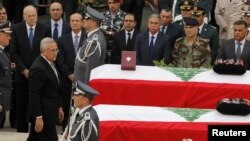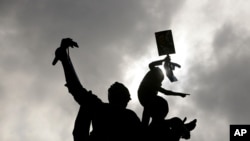Thousands of Lebanese gathered in Beirut's Martyrs Square for the funeral of police intelligence chief Wissam al-Hassan, killed in the explosion of a car bomb on Friday.
A sea of mourners gathered in Martyrs Square outside the Mohammed al Amin mosque as Lebanon's top political and religious leaders attended prayers inside. The flag-draped coffins of Hassan and an officer who died with him lay in state as the mufti of Tripoli, Malek Sha'ar, delivered the funeral oration.
As the prayers ended, several religious and political figures addressed the crowd, saying that Lebanon and the opposition March 14 coalition have paid “too high a price and suffered too many martyrs” in recent years.
The slain police intelligence official was allied with Lebanon's anti-Syrian opposition and seen as a supporter of the mainly Sunni rebels fighting to oust Syrian President Bashar al-Assad. Syria's civil war has heightened political and sectarian tensions in neighboring Lebanon.
Former Lebanese prime minister Fouad Siniora told the crowd at the funeral that it is time for the assassinations to stop and for the current government, which is supported by the pro-Syrian Shi'ite movement Hezbollah, to resign.
He said the government of Prime Minister Najib Mikati must no longer cover for the crimes that Siniora says are being committed. Sinioria added that Mikati himself bears moral responsibility for those crimes and must give way to a neutral, unity government.
The prime minister told a news conference Saturday that he had offered his resignation, but that President Michel Suleiman had asked him to stay on until political talks take place, to avoid a vacuum.
Siniora also accused Syrian Intelligence Chief Ali Mamlouk and pro-Syrian Lebanese politician Michel Samaha of being behind Wissam al Hassan's assassination. Samaha was arrested last month after being taped discussing a plot to blow-up politicians who oppose Syria.
Several blocks away, a crowd of young men threw stones and waved metal bars at a barbed wire barrier protecting the prime minister's offices. Security forces guarding the old Ottoman structure fired tear gas to keep the angry protesters from storming the barriers.
Earlier, a police band played funeral dirges as President Suleiman awarded the slain police inspector Lebanon's highest honor, promoting him posthumously to the rank of general. Suleiman told the crowd that Hassan's killing must not go unpunished:
He urged Lebanon's political leaders not to cover for the crimes that are being committed, saying that the people want the courts and the police to find and prosecute the criminals.
Christian political leader Michel Aoun, who is part of the outgoing pro-Syrian government, called Wissam al-Hassan a martyr but insisted that some political leaders are “trying to use his death for political purposes.”
A sea of mourners gathered in Martyrs Square outside the Mohammed al Amin mosque as Lebanon's top political and religious leaders attended prayers inside. The flag-draped coffins of Hassan and an officer who died with him lay in state as the mufti of Tripoli, Malek Sha'ar, delivered the funeral oration.
As the prayers ended, several religious and political figures addressed the crowd, saying that Lebanon and the opposition March 14 coalition have paid “too high a price and suffered too many martyrs” in recent years.
The slain police intelligence official was allied with Lebanon's anti-Syrian opposition and seen as a supporter of the mainly Sunni rebels fighting to oust Syrian President Bashar al-Assad. Syria's civil war has heightened political and sectarian tensions in neighboring Lebanon.
Former Lebanese prime minister Fouad Siniora told the crowd at the funeral that it is time for the assassinations to stop and for the current government, which is supported by the pro-Syrian Shi'ite movement Hezbollah, to resign.
He said the government of Prime Minister Najib Mikati must no longer cover for the crimes that Siniora says are being committed. Sinioria added that Mikati himself bears moral responsibility for those crimes and must give way to a neutral, unity government.
The prime minister told a news conference Saturday that he had offered his resignation, but that President Michel Suleiman had asked him to stay on until political talks take place, to avoid a vacuum.
Siniora also accused Syrian Intelligence Chief Ali Mamlouk and pro-Syrian Lebanese politician Michel Samaha of being behind Wissam al Hassan's assassination. Samaha was arrested last month after being taped discussing a plot to blow-up politicians who oppose Syria.
Several blocks away, a crowd of young men threw stones and waved metal bars at a barbed wire barrier protecting the prime minister's offices. Security forces guarding the old Ottoman structure fired tear gas to keep the angry protesters from storming the barriers.
Earlier, a police band played funeral dirges as President Suleiman awarded the slain police inspector Lebanon's highest honor, promoting him posthumously to the rank of general. Suleiman told the crowd that Hassan's killing must not go unpunished:
He urged Lebanon's political leaders not to cover for the crimes that are being committed, saying that the people want the courts and the police to find and prosecute the criminals.
Christian political leader Michel Aoun, who is part of the outgoing pro-Syrian government, called Wissam al-Hassan a martyr but insisted that some political leaders are “trying to use his death for political purposes.”





